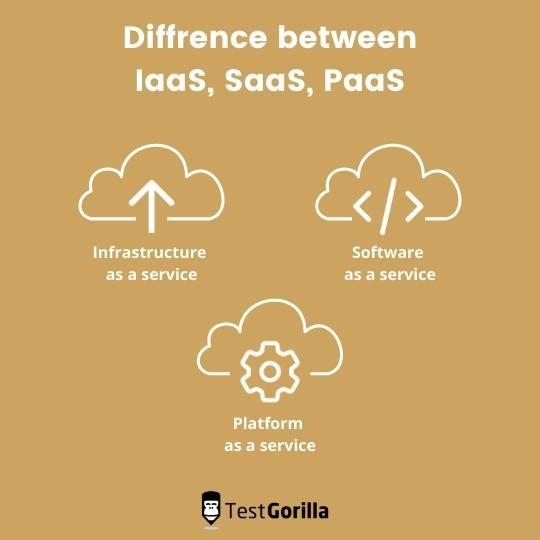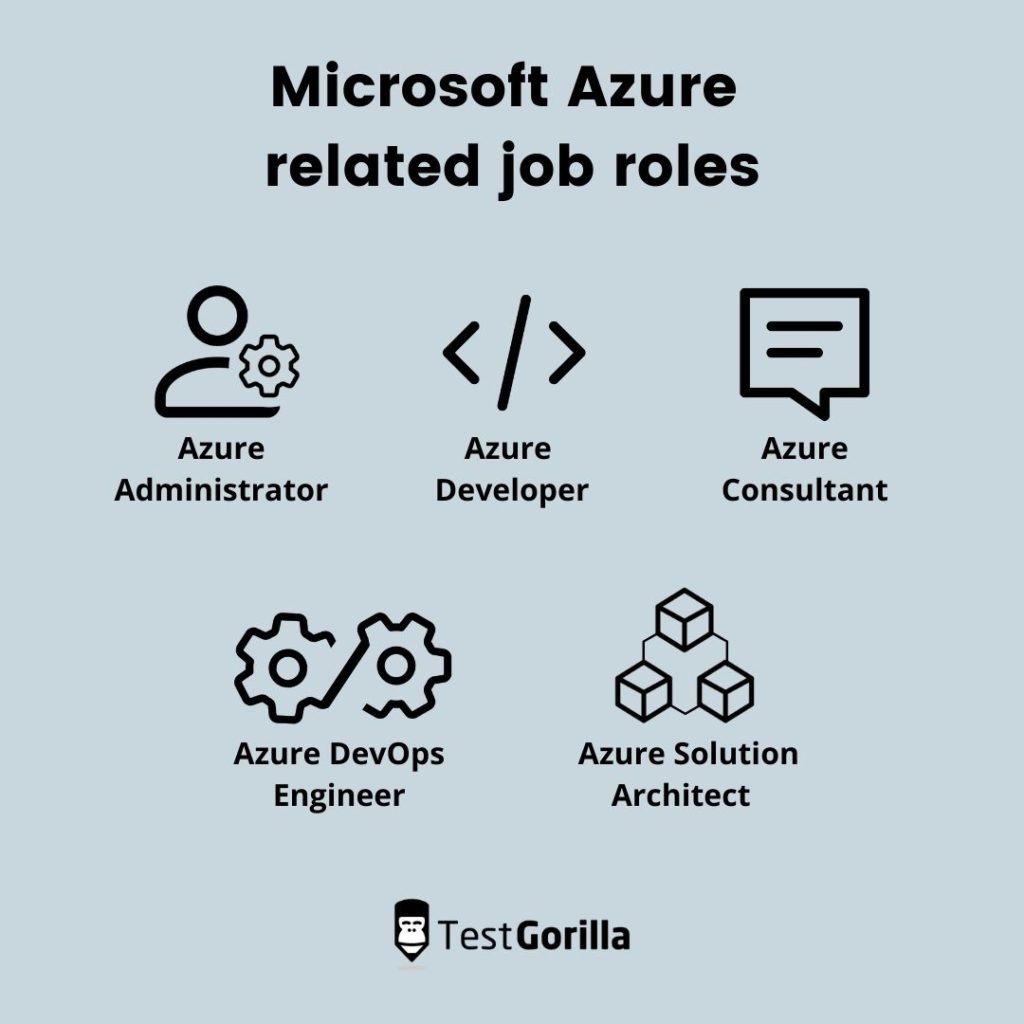Table of contents
Most businesses today are either on the cloud or are migrating to the cloud. Microsoft Azure may be a vital cloud service for your business if you are moving your systems, networks, and databases to the cloud.
Therefore, as a recruiter, there’s a good chance you will have to hire Microsoft Azure developers to handle cloud migration, maintenance, and solve cloud-related problems. But first, let’s see what exactly Microsoft Azure is.
What is Microsoft Azure?
Microsoft Azure, formerly known as Windows Azure, is a cloud computing service similar to Amazon Web Services (AWS), Google Cloud Platform, or IBM Cloud. Microsoft Azure enables customers to build, test, deploy, and manage applications through data centers.
Azure is quite versatile and flexible in its use. It provides:
SaaS—software as a service, which allows developers to use business apps, such as CRM (customer relationship management) and ERP (enterprise resource planning) tools.
PaaS—platform as a service, which helps developers easily publish, maintain, and manage websites. They can also create websites on the platform using Node.js or the Python programming language.
IaaS—infrastructure as a service, which allows developers to launch Microsoft and Linux virtual machines.
Microsoft Azure also supports different programming languages, third-party software systems, and apps.
What is Microsoft Azure used for?
Microsoft Azure has many applications that you can implement in your business infrastructure. Take a look at the five most common Microsoft Azure-related job roles to understand if you need to hire a candidate for one of them:
Azure Administrator. Azure admins install, configure, and monitor everyday system functions to ensure that everything is running smoothly. They usually serve as the middle point between Azure users and the tech team, so they should also be excellent communicators. Admins need to be well versed in SQL databases, run audits, and monitor the performance of apps.
Azure Developer. Azure developers create and run apps on the Azure system. They design, maintain, and create solutions that solve business problems and challenges. Since Azure development is a broad field, developers usually specialize in one specific area, such as cloud storage, PaaS solutions, or security.
Azure Consultant. An Azure consultant, also often called a pre-sales consultant, helps your business translate its operations to a specific cloud. They take your business needs and then translate them into a concrete plan that helps your company move to the cloud.
Azure DevOps Engineer. Azure DevOps engineers bring together people, tech, and users to improve products and meet business objectives and needs. They need to design scalable Azure solutions and work in areas such as virtual machine environments and network architecture.
Azure Solution Architect. Azure solution architects take specs from users and create solutions that correspond to those specifications. They gather requirements, design apps, determine the right infrastructure, and ultimately configure the solution.
The best insights on HR and recruitment, delivered to your inbox.
Biweekly updates. No spam. Unsubscribe any time.
Why you need a good Microsoft Azure developer
Many businesses today have a real fear about migrating their applications and systems to the cloud, with concerns about network security, availability, and potential downtime of the cloud service; identifying experts capable of designing resilient setups is crucial, which an advanced networking in Azure test can help with. So these businesses stay put with their aging technology even though it’s not fulfilling their needs.
But with Microsoft Azure in the picture, businesses are slowly starting to migrate to the cloud. Some have fully migrated, while others have only partially done so because of the fears mentioned above.
To manage your migration effectively and effortlessly, you will need to hire skilled Azure developers who can keep your important business apps and systems running without hiccups.
The benefits of hiring a good Microsoft Azure developer
By 2023, 40% of all enterprise workloads will be deployed in cloud infrastructure and platform services, up from 20% in 2020. For this reason, Microsoft Azure developers will be in high demand (and already are).
This means that getting capable Microsoft Azure developers will become more difficult, as the supply of developers won’t be able to keep up with the rapidly rising demand.
Not only that—since there will be more and more devices connected to the network (with the rise of Internet of Things or IoT), cyberattacks will start occurring more often, and network and data security will start to become an even greater priority. These are all problems a proficient Microsoft Azure developer can solve.
Things to remember when hiring a Microsoft Azure developer
There are a few things you should know before you hire a Microsoft Azure developer:
Be ready to pay a bit more. While you might think that bringing on a professional is expensive, hiring an amateur could end up being much more costly for your business. Migrating your servers is challenging in itself, and you should only trust skilled developers to do this.
Hire before starting the migration. Hire a Microsoft Azure developer before you start executing the migration to the cloud.
Projects count more than length of experience. When it comes to hiring Azure developers, projects carry more weight than time spent working with Azure. Projects can be highly complicated, involve a lot of moving parts, and require the developer to grow quickly to solve challenges. So try to look at examples of past projects to get an idea of the developer’s skill set.
Microsoft Azure developer skills
Now you know why you need a talented Microsoft Azure developer—but how do you find one? First, you should understand what kind of skills you need to look for in a Microsoft Azure developer. All of the following play a major role in Azure development:
SQL databases (SQL Server)
PowerShell
Dynamics 365
.NET
Also, developers need certain soft skills in order to work well with their team members:
Decision-making skills
Emotional intelligence
Solution-oriented mindset
Problem-solving skills
How to hire a Microsoft Azure developer
Hiring a Microsoft Azure developer is easier said than done. It’s becoming increasingly difficult to find and hire a skillful Azure developer in today’s market. With that in mind, here are three steps you can use to hire a qualified Microsoft Azure developer:
Pre-employment tests
Even though it’s quite hard to find an expert Microsoft Azure developer, that doesn’t mean that you won’t get a lot of applications for the role.
A lot of people will apply for the open position, and you will need to find a way to distinguish between those who are skilled enough to move forward in the process and those who need to work more on their skill sets.
Pre-employment tests serve a great function here. They are cost-effective, scalable, and save time for the hiring manager as well as for the candidate. It makes no difference to a recruiter if 50 or 150 people apply because it only takes one click to distribute pre-employment tests.
Skills tests
Not only do you need to give out pre-employment tests to your candidates, but you also need to verify the claims they make in their CVs. You do this by giving them skills tests.
Someone can write in their CV that they know how to work with Microsoft Azure, but you should verify that claim by giving them a Microsoft Azure test.
TestGorilla’s skills tests are made by subject-matter experts (SMEs) and are heavily tested. First, a test is created by an SME, and then another SME goes through the test and gives feedback. After that, the test goes through a rigorous feedback process in which hundreds of people take the test and provide information on how it can be improved.
Only after numerous iterations is the test published in our Test Library and made available to our clients. That’s why you can rely on TestGorilla’s skills tests to verify the skill sets of your candidates.
Azure developer certification
Most Microsoft Azure developers go through a long and arduous journey to get an Azure developer certification. They do this for a couple of reasons:
Career flexibility. Developers can get certified in nine different Azure areas, which provides quite a lot of career flexibility.
Structured learning and higher salaries. Becoming certified gives developers an opportunity to learn in a structured format so that they don’t have to create their own curriculums. It also helps them to earn a higher salary in the market.
Credibility. Many Azure developers don’t have Azure certifications. Most of these developers haven’t had time to get certified in a certain area of Azure because they have had to lead projects at their companies. But certified developers tend to have more credibility in the marketplace—their certifications tell recruiters and hiring managers that they have the necessary skill set to perform the role.
Find the best Microsoft Azure developer
Most businesses will move their systems, networks, and apps to the cloud, and this will most likely include your business. You will need an adept Microsoft Azure developer to help you get set up, whether you’re doing a partial or a full migration to the cloud.
If you need help hiring a Microsoft Azure developer, you should check out TestGorilla’s pre-employment tests to find the relevant tests for your candidates. Our Test Library has hundreds of pre-employment tests that you can choose from. Get started today for free and make better hiring decisions, faster and bias-free.
You've scrolled this far
Why not try TestGorilla for free, and see what happens when you put skills first.




















